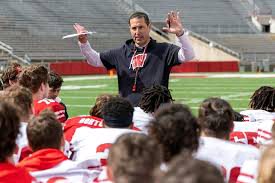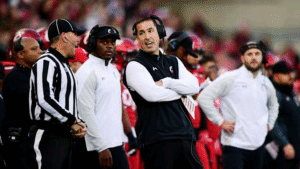
Luke Fickell’s Time at Wisconsin: A Deep Dive Into His Struggles, Successes, and the Shadow of His Former Staff
When Luke Fickell accepted the head coaching role at the University of Wisconsin, expectations were sky-high. He arrived in Madison with a reputation as one of the most successful and respected coaches in college football, primarily due to his phenomenal run at the University of Cincinnati. However, his first year with the Badgers has left fans, analysts, and even Fickell himself, questioning whether the same formula that brought him acclaim at Cincinnati could be replicated in the Big Ten.

At a recent press conference during Big Ten Media Days, Fickell didn’t shy away from the tough questions. Rather than brushing off concerns about his team’s underwhelming performance, he faced them head-on. “Last year was not the standard,” Fickell said candidly. “That’s not the expectation, and it’s not the reason I was brought here.”
His words reflect a coach who is both self-aware and willing to hold himself accountable. But they also underscore a growing sentiment among college football observers that something is missing from Fickell’s Wisconsin tenure that was crucial to his prior success: his former staff of elite assistants.
Cincinnati’s Secret Sauce: The Coaches Behind the Curtain
The roots of this growing critique can be traced back to an online conversation among college football fans, including a social media user operating under the handle “College Football Watcher.” The discussion, originally posted on Twitter (now known as X), was eventually spotlighted in an article by Joel Scheve at CincyOnTheProwl.com. In this article, Scheve amplifies a theory that has gained traction — that Luke Fickell’s remarkable run at Cincinnati was not solely the result of his own coaching genius, but rather the collective brilliance of a now-dispersed group of assistant coaches, many of whom followed Marcus Freeman to Notre Dame.
The original post listed the names of several key assistants who played integral roles during Fickell’s tenure at Cincinnati:
Marcus Freeman (Defensive Coordinator)
Gino Guidugli (Quarterbacks Coach)
Mike Brown (Wide Receivers Coach)
Mike Mickens (Defensive Backs Coach)
Brian Mason (Special Teams Coordinator)
Not only did these coaches contribute to the Bearcats’ rise as a top-tier non-Power Five program, but most of them followed Marcus Freeman when he became the head coach at Notre Dame, further strengthening the theory that Fickell’s success was buoyed by his staff.
The Marcus Freeman Effect
Marcus Freeman is perhaps the most prominent figure among this coaching tree. After serving as Fickell’s defensive coordinator from 2017 to 2020, Freeman was hired as Notre Dame’s defensive coordinator and, not long after, became the head coach. Upon arriving in South Bend, he brought with him a wave of coaching talent that had been molded during their years together at Cincinnati.
In addition to Brown, Guidugli, and Mason, Freeman also brought on Mike Denbrock, Al Washington, and Max Bullough — a virtual “all-star” lineup of assistants. This exodus left Fickell with a major void to fill. And while he has certainly hired talented staff since, the synergy and familiarity that his Cincinnati crew brought to the table have proven difficult to replicate.
Freeman’s rapid ascent at Notre Dame, meanwhile, has only added fuel to the fire. As Freeman began stacking up wins and pushing Notre Dame into national playoff conversations, Fickell’s Badgers found themselves struggling to live up to expectations.
Comparing Resources and Environments: Wisconsin vs. Notre Dame
A counter-argument often raised in defense of Fickell is the differing landscapes between the two programs. Notre Dame, after all, boasts a prestigious history, a national recruiting brand, and expansive institutional resources. Wisconsin, while certainly a respected Big Ten program, may not enjoy the same national profile.
Yet, Joel Scheve argues that the disparity in resources isn’t as stark as some might assume. “Why is it that Freeman has had so much more success than Fickell since leaving Cincinnati?” he writes. “It’s obvious that Notre Dame has better resources than Wisconsin, but not by far. Wisconsin is a hotter destination for recruits and transfers than Cincinnati, yet [Fickell] is recruiting the same kind of talent he was at Cincinnati and not having good results.”
This critique goes beyond superficial comparison. Scheve suggests that while Fickell has maintained a similar recruiting approach — targeting underrated, coachable athletes with developmental upside — the lack of strong coaching around him at Wisconsin has limited the effectiveness of that strategy. In essence, it’s not just about who you recruit, but also about who you hire to coach them.
Fickell’s Coaching Philosophy and the Importance of Staff Chemistry
Luke Fickell’s coaching style is built on toughness, discipline, and player development. It’s a system that thrived at Cincinnati, where he was able to mold mid-level recruits into NFL-caliber talent. But that system was heavily reliant on his staff’s ability to coach players up, install efficient schemes, and foster a winning culture.
At Wisconsin, the challenges are different. The Big Ten is a more competitive and resource-rich conference than the American Athletic Conference. Opponents are deeper, faster, and more experienced. Every mistake is magnified, and every missed opportunity could be the difference between a New Year’s Six bowl and a middling bowl game in December.
In this context, the margin for error shrinks dramatically. That’s why the importance of assistant coaches becomes even more apparent. Fickell seems to have realized this, as he’s now in the process of assembling a staff that mirrors the one he had at Cincinnati — emphasizing strong player development, a balanced offensive scheme, and defensive discipline.
The Rebuild: Fickell’s Adjustments and Staff Additions
Despite the early struggles, there are signs that Fickell is taking steps to rectify the shortcomings of his first season. He has made staffing adjustments aimed at stabilizing the program and returning to the formula that brought him success at Cincinnati.
Notably, Fickell has hired coaches with proven track records in development and offensive innovation. While he initially leaned on some familiar names and schemes, the results were inconsistent. Now, he appears to be evolving, showing a willingness to adapt — a critical trait for any head coach in the modern era of college football.
In interviews, Fickell has stressed the importance of staff alignment and trust. He often talks about the need for every coach on his staff to be pulling in the same direction. This philosophy mirrors what he built at Cincinnati, where cohesion among assistants led to one of the most successful Group of Five runs in recent memory, culminating in a College Football Playoff appearance.
The Pressure to Succeed at Wisconsin
Of course, time is not unlimited. Wisconsin is a program with passionate fans, a proud tradition, and a history of success. While Fickell still enjoys support from the university and athletic department, the honeymoon period has clearly ended.
This upcoming season is being widely viewed as a make-or-break year. The expectation is not necessarily a Big Ten title, but rather a clear upward trajectory — progress on the field, improvement in recruiting, and a sense that the program is moving in the right direction.
Fickell’s track record suggests he’s capable of such a turnaround. He led Cincinnati to a 53–10 record over five years, won multiple conference championships, and helped produce numerous NFL draft picks. But to replicate that success in the Big Ten, he may need to acknowledge that part of what made Cincinnati special was the people around him.
Lessons From Cincinnati: A Humbling but Valuable Reality
The narrative that Luke Fickell’s success was dependent on his staff doesn’t have to be a criticism — it can also be seen as a reminder of how important collaboration is in football. Head coaches often get the lion’s share of credit, but assistants are the ones who work with players day in and day out, install the systems, break down the film, and build the relationships that translate into wins.
Fickell seems to be internalizing that lesson. He’s no longer trying to win by simply replicating his Cincinnati scheme; instead, he’s building a program that values synergy, development, and strategic diversity. He’s looking to recreate the same environment that fostered growth, not just copy the playbook.
If he succeeds in doing so, the results could follow. And in doing so, he’ll not only silence the critics but also prove that while assistants are critical to success, a great head coach knows how to find them, empower them, and build a culture around them.
Looking Ahead: What’s Next for Fickell and the Badgers
The path forward for Luke Fickell at Wisconsin is one filled with both opportunity and pressure. The program has a solid infrastructure, passionate fan base, and access to Big Ten recruiting pipelines. Fickell has already laid the foundation — now it’s a matter of execution.
If he can align his staff, improve player development, and recruit talent that fits his vision, there’s every reason to believe Wisconsin can return to the upper echelon of the Big Ten. But if the same issues that plagued Year 1 persist into Year 2 and beyond, questions about his ability to adapt and lead a Power Five program will only grow louder.
Conclusion: A Tale of Two Coaches
The contrast between Luke Fickell and Marcus Freeman serves as a fascinating case study in modern college football. Two coaches, both molded at Cincinnati, have taken divergent paths since their time together. Freeman, armed with many of the same assistants, is ascending at Notre Dame. Fickell, starting from scratch at Wisconsin, is still trying to recapture the magic.
But college football is a long game. Legacies aren’t written in one or two seasons. For Luke Fickell, the road may be bumpier than expected, but if he continues to reflect, adjust, and build the right team around him, there’s still time for redemption — and success.
Leave a Reply